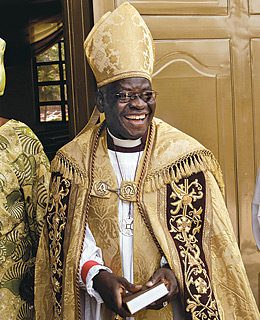
Archbishop Peter Akinola
If the Anglican Communion, the 400-plus-year-old, 78 million-member fellowship of churches that the British empire seeded around the globe, falls apart, Peter Akinola, the Archbishop of Nigeria, will have been a catalyst, even if he does not end up prince of one of the pieces.
Akinola, 63, has been a harsh critic of the Episcopal Church (U.S.A.), which elected an openly gay bishop in 2003. The communion's current rancorous disunion bears his imprint. When Anglicanism's 38 primates recently presented the Episcopalians with demands for a retreat on sexuality and direct communion involvement in Episcopal governance, the church leaders were echoing Akinola's impatience with earlier, more deliberate measures.
Unless the trend reverses, Episcopalianism may be headed toward a break with the communion. Or perhaps a larger group of liberal provinces will calf off. Full schism would be achieved if Anglicanism's conservative southern provinces decided that even the Anglican Church's top official, the Archbishop of Canterbury, is too liberal and chose their own leader—perhaps Akinola. The Nigerian cleric has denied any leadership ambition, and the more extreme his postures, the slimmer his chances. But even if he never becomes the Canterbury of the global south, he will have sparked a shift in Christianity's world order.
With reporting by Gilbert da Costa